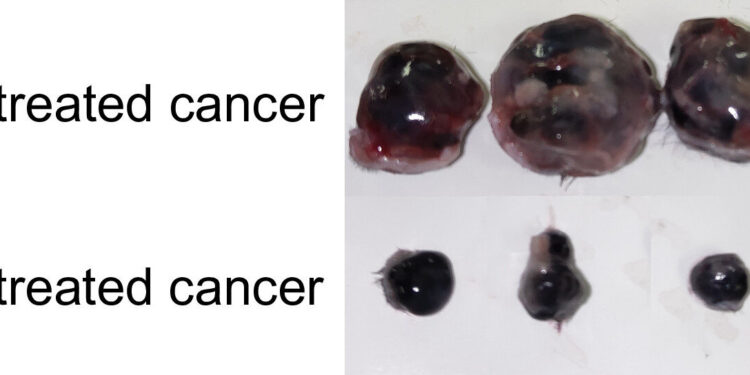Compared to untreated cancer, the TRED-I system significantly reduced cancer size in mouse models. Credit: Proceedings of the National Academy of Sciences (2024). DOI: 10.1073/pnas.2310821121
New technology to increase the visibility of cancer cells to the immune system using CRISPR has been developed and could lead to a new way of treating cancer.
Major histocompatibility complex (MHC) class I molecules are an immune complex present on the surface of all cells in humans. MHC class I molecules are a prerequisite for the immune system to recognize and eliminate cancer. When cancer cells face pressure from the immune system, they actively reduce their MHC class I molecules, so the cancer cells can hide from attracting the attention of CD8.+ T cells, the main cells of the immune system that fight cancer.
Researchers in Japan and the United States, led by Professor Koichi Kobayashi of Hokkaido University and Texas A&M Health Center, and Dr. Paul de Figueiredo, Bond LSC Principal Investigator and NEXTGEN Precision Health Endowed Professor at at the University of Missouri, have developed technology to increase the amount of MHC class I in cancer cells. This development, a new method aimed at boosting the immune system’s ability to detect and eliminate cancer cells, was published in the journal Proceedings of the National Academy of Sciences.
“Our discovery has the potential to transform our approach to cancer treatment.” Kobayashi said. “Our technology allows us to specifically target immune genes and activate the immune system against cancer cells, offering hope to those who are resistant to current immunotherapy.”
Kobayashi and his team previously identified a gene, called NLRC5, that regulates MHC class I levels. They further discovered that NLRC5 is suppressed by turning off molecular switches existing on DNA in cancers – through a process called DNA methylation – to reduce MHC class I levels.
Their technology, known as the Targeted Reactivation and Demethylation for MHC-I (TRED-I) system, was able to restore DNA methylation of the NLRC5 gene and further activate NLRC5, thereby increasing MHC class I levels in cancer without causing serious side effects.
“New modalities to fight cancer like this are desperately needed because we have few solutions to fight certain types of cancer,” de Figueiredo said. “This is a radically new approach and I feel lucky to be part of it.”
TRED-I has been tested in animal models of cancer. It significantly reduced tumor size and increased cytotoxic CD8 activity.+ T cells. When used in conjunction with existing immunotherapy, TRED-I significantly improved treatment effectiveness.
Unexpectedly, the TRED-I system was found to be effective for tumor distant from the original targeted tumor, demonstrating its potential to treat metastasized cancers.
“This work is the culmination of research carried out by our team over the past decade,” concludes Kobayashi. “It’s great to shed light on moving our findings toward potential clinical applications. We believe that with further improvements, the TRED-I system could significantly contribute to cancer treatment.”
Further research will focus on direct delivery of the TRED-I system to cancer patients. Such drugs could improve the effectiveness of the immune system in eliminating cancer and could also improve the response to existing therapies.
More information:
et al, Targeted demethylation and activation of NLRC5 increases cancer immunogenicity through MHC class I, Proceedings of the National Academy of Sciences (2024). DOI: 10.1073/pnas.2310821121. doi.org/10.1073/pnas.2310821121
Provided by Hokkaido University
Quote: New technology makes it easier for the immune system to detect and destroy cancer (January 29, 2024) retrieved January 29, 2024 from
This document is subject to copyright. Except for fair use for private study or research purposes, no part may be reproduced without written permission. The content is provided for information only.



